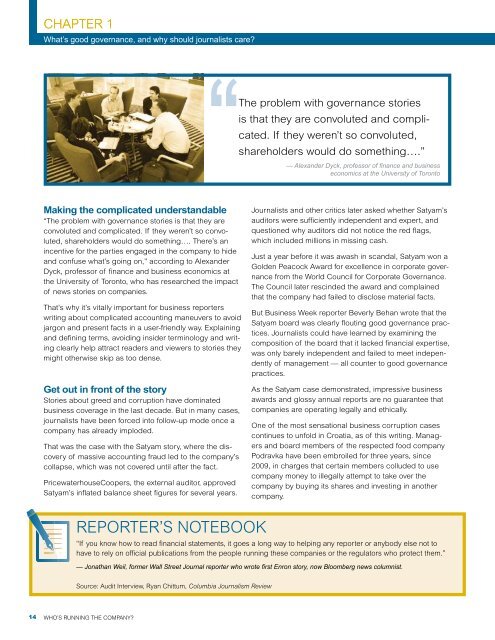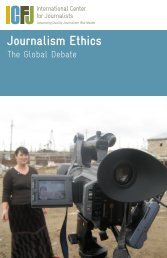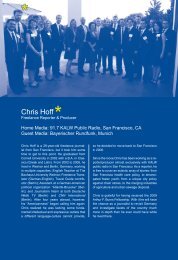Who's Running the Company? - International Center for Journalists
Who's Running the Company? - International Center for Journalists
Who's Running the Company? - International Center for Journalists
Create successful ePaper yourself
Turn your PDF publications into a flip-book with our unique Google optimized e-Paper software.
CHAPTER 1<br />
What’s Good good governance, Governance and why Why should Should journalists <strong>Journalists</strong> care? Care?<br />
The problem with governance stories<br />
is that <strong>the</strong>y are convoluted and complicated.<br />
If <strong>the</strong>y weren’t so convoluted,<br />
shareholders would do something….”<br />
— Alexander Dyck, professor of finance and business<br />
economics at <strong>the</strong> University of Toronto<br />
‘‘<strong>Journalists</strong> and o<strong>the</strong>r critics later asked whe<strong>the</strong>r Satyam’s<br />
Making <strong>the</strong> complicated understandable<br />
“The problem with governance stories is that <strong>the</strong>y are<br />
convoluted and complicated. If <strong>the</strong>y weren’t so convoluted,<br />
shareholders would do something…. There’s an<br />
incentive <strong>for</strong> <strong>the</strong> parties engaged in <strong>the</strong> company to hide<br />
and confuse what’s going on,” according to Alexander<br />
Dyck, professor of finance and business economics at<br />
<strong>the</strong> University of Toronto, who has researched <strong>the</strong> impact<br />
of news stories on companies.<br />
That’s why it’s vitally important <strong>for</strong> business reporters<br />
writing about complicated accounting maneuvers to avoid<br />
jargon and present facts in a user-friendly way. Explaining<br />
and defining terms, avoiding insider terminology and writing<br />
clearly help attract readers and viewers to stories <strong>the</strong>y<br />
might o<strong>the</strong>rwise skip as too dense.<br />
Get out in front of <strong>the</strong> story<br />
Stories about greed and corruption have dominated<br />
business coverage in <strong>the</strong> last decade. But in many cases,<br />
journalists have been <strong>for</strong>ced into follow-up mode once a<br />
company has already imploded.<br />
That was <strong>the</strong> case with <strong>the</strong> Satyam story, where <strong>the</strong> discovery<br />
of massive accounting fraud led to <strong>the</strong> company’s<br />
collapse, which was not covered until after <strong>the</strong> fact.<br />
PricewaterhouseCoopers, <strong>the</strong> external auditor, approved<br />
Satyam’s inflated balance sheet figures <strong>for</strong> several years.<br />
auditors were sufficiently independent and expert, and<br />
questioned why auditors did not notice <strong>the</strong> red flags,<br />
which included millions in missing cash.<br />
Just a year be<strong>for</strong>e it was awash in scandal, Satyam won a<br />
Golden Peacock Award <strong>for</strong> excellence in corporate governance<br />
from <strong>the</strong> World Council <strong>for</strong> Corporate Governance.<br />
The Council later rescinded <strong>the</strong> award and complained<br />
that <strong>the</strong> company had failed to disclose material facts.<br />
But Business Week reporter Beverly Behan wrote that <strong>the</strong><br />
Satyam board was clearly flouting good governance practices.<br />
<strong>Journalists</strong> could have learned by examining <strong>the</strong><br />
composition of <strong>the</strong> board that it lacked financial expertise,<br />
was only barely independent and failed to meet independently<br />
of management — all counter to good governance<br />
practices.<br />
As <strong>the</strong> Satyam case demonstrated, impressive business<br />
awards and glossy annual reports are no guarantee that<br />
companies are operating legally and ethically.<br />
One of <strong>the</strong> most sensational business corruption cases<br />
continues to unfold in Croatia, as of this writing. Managers<br />
and board members of <strong>the</strong> respected food company<br />
Podravka have been embroiled <strong>for</strong> three years, since<br />
2009, in charges that certain members colluded to use<br />
company money to illegally attempt to take over <strong>the</strong><br />
company by buying its shares and investing in ano<strong>the</strong>r<br />
company.<br />
REPORTER’S NOTEBOOK<br />
“If you know how to read financial statements, it goes a long way to helping any reporter or anybody else not to<br />
have to rely on official publications from <strong>the</strong> people running <strong>the</strong>se companies or <strong>the</strong> regulators who protect <strong>the</strong>m.”<br />
— Jonathan Weil, <strong>for</strong>mer Wall Street Journal reporter who wrote first Enron story, now Bloomberg news columnist.<br />
Source: Audit Interview, Ryan Chittum, Columbia Journalism Review<br />
14<br />
WHO’S RUNNING THE COMPANY?
















